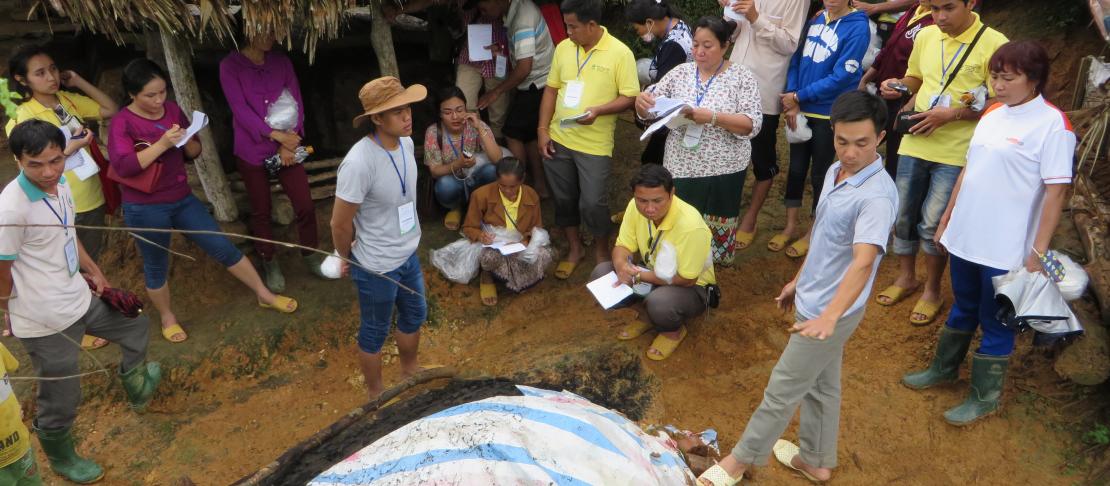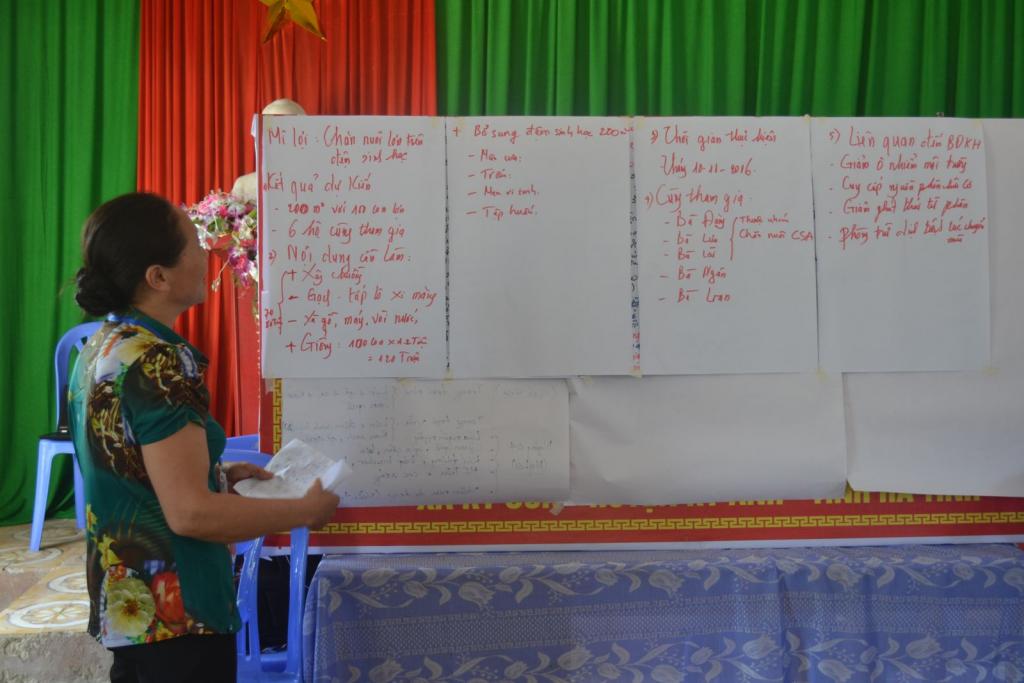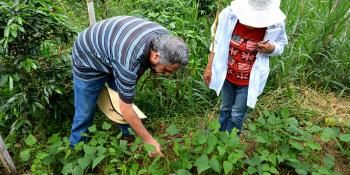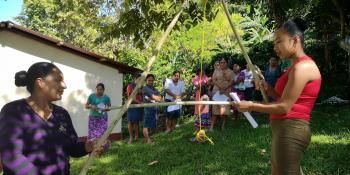Viet, Khmer, Lao farmer leaders commit to climate-smart agriculture

Farmer leaders from Southeast Asia learn about climate-smart agriculture from a five-day roving workshop in Vietnam and plan to share with other farmers.
An old saying goes, “Experience is the best teacher,” and so it is especially in addressing climate change. Although villages and communities may experience different impacts of climate change, knowledge could still be shared with others experiencing the same conditions. After the success of the first roving workshop, a new platform facilitating the farmer-to-farmer learning process through field visits and discussions, organized in the Philippines in 2015, a second roving workshop for Southeast Asian village leaders and farmers was held between 22 and 28 May 2016 in Vietnam.
Nineteen village leaders and farmers from the six Climate-Smart Villages (CSVs) in Vietnam (Ma, My Loi and Tra Hat), Lao PDR (Ekxang and Phailom) and Cambodia (Rohal Suong) went around the Phu Tho, Yen Bai, Hai Duong, Ha Noi and Ha Tinh provinces in Vietnam to learn about different climate-smart agriculture (CSA) techniques and practices. This second roving workshop aimed to enhance farmers’ understanding of CSA through experiential learning, and to help them identify practices applicable in their own communities.
Researchers from the International Rice Research Institute (IRRI), International Center for Tropical Agriculture (CIAT) and World Agroforestry Centre (ICRAF) Vietnam also participated in the roving workshop. Laotian and Cambodian students from the Vietnam National University of Agriculture (VNUA) served as translators for the non-Vietnamese participants.
What did they observe?
Diversification of agriculture products, such as the home gardens in Yen Bai and Ha Tinh provinces, improves a household’s resilience to climate change and extreme weather events. Since 2015 Mr. Tran Trung Kien from Ma CSV has integrated his garden with different agricultural products, such as vegetables, fruit trees and forage feeds for his cows. This available feed source could help sustain household income from livestock through alleviating the impacts of severe cold spells.
Changing traditional practices to adapt to unfavorable conditions is one practice Mr. Nguyen Van Tam, head of Ma CSV, picked up during the first roving workshop. He keeps goats in modern cages and feeds them with forage crops grown in his home garden.
“Unusually intensive rain and high soil humidity have brought diseases to my goats before. This new raising technique could protect goats from both disease and unfavorable weather,” said Mr. Tam.
Mitigation of methane emissions from livestock production was also introduced. Traditional manure processing, which is unsanitary and emits methane, a greenhouse gas, was replaced with new techniques. During the roving workshop, participants learned how to use alcohol yeast as an effective microorganism in making compost from manure with the living bed technology. They also saw the benefits of vermiculture from different models in Yen Bai, Ha Noi and Ha Tinh provinces.
Demonstrations of CSA practices and climate-resilient crop varieties, such as drought-tolerant and early maturing rice varieties, developed by research institutes were introduced to the farmers. The farmers and researchers also discussed management practices, such as integrated farming systems, greenhouse vegetable farming and rice management at the field level. They explored how to adapt these options to specific conditions in their villages.

A farmer leader from My Loi CSV plans to introduce the living bed technology to her village. This technology would help maintain the hygiene, reduce emissions and increase the productivity of pig-raising. Photo: Tran Ha My (ICRAF)
What will they do next?
On the last day of the roving workshop, discussed which climate-smart technologies and practices they could test in their own villages. They also talked about scaling up and out these practices.
Farmers from Tra Hat, Rohal Suong and Phailom would like to test the early maturing and drought-tolerant rice varieties in the coming seasons. They expect these varieties would improve rice production for their villages.
Mr. Phung Van Viet, the head of Tra Hat CSV, said: “I believe that using this variety may prevent losses from seasonal flood and saltwater intrusion. The variety also seems to have a higher yield than what we are growing in Bac Lieu.”
Vermiculture was highly appreciated by farmers from Tra Hat, Ma and My Loi. They saw the multiple benefits in combining it with livestock production.
Mrs. Le Thi Kim Thuy, chair of the Village Women’s Association in Tra Hat, said: “It is simple enough to set up. I will introduce vermiculture to the women in my group in our next monthly meeting. We could make use of the cattle manure which is just disposed of in rivers, lakes and ponds.”
Women farmers from My Loi and Ekxang were interested in the living bed technology in pig-raising. They plan to introduce it to the women’s associations of their villages. Mrs. Nguyen Thi Cuong, a My Loi farmer, thinks six members of the My Loi Women’s Association can allocate 200 m2 to implement it in their village.
The second roving workshop not only enriched the farmers’ knowledge but also encouraged them to adopt and promote climate-smart technologies or practices in their own communities.
“After seeing the effective vermiculture demonstrations in My Loi village, I’m more confident in scaling up this model in my village. I will encourage members of the Village Farmers’ and Women’s Association to join,” shared Ms Nguyen Thi Thu, chair of the Women’s Association in Ma CSV.
Read more:
- Farmers in Southeast Asia learn about climate-smart agriculture practices
- New guidance for climate-smart agriculture in Southeast Asia
- Coordinating climate-smart agriculture across Southeast Asia
Tran Ha My is a communications assistant with the World Agroforestry Centre Viet Nam.
Bui Tan Yen is a Science Officer with CCAFS SEA.



